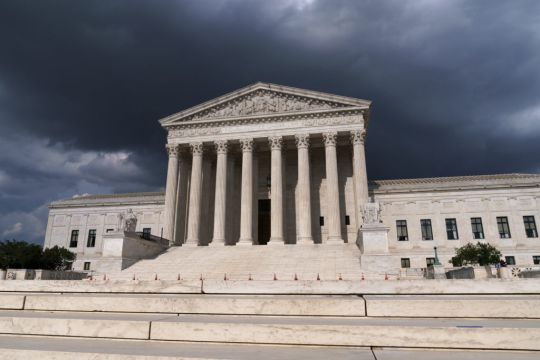The US Supreme Court on Wednesday began hearing arguments in a case on whether to gut abortion rights in America as it weighs Mississippi's bid to overturn the landmark 1973 Roe v Wade ruling that legalised the procedure in the country.
The court, which has a 6-3 conservative majority, is hearing at least 70 minutes of oral arguments in the southern state's appeal to revive its ban on abortion starting at 15 weeks of pregnancy. Lower courts blocked the Republican-backed law.
Jackson Women's Health Organisation, the only abortion clinic in Mississippi, challenged the law and has the support of Democratic president Joe Biden's administration. A ruling is expected by the end of next June.
Hundreds of protesters from both sides of the abortion debate rallied outside the courthouse ahead of the arguments. Anti-abortion protesters held huge signs reading "abortion is murder," some carrying Christian crosses. Pro-choice activists chanted "what do we want? Abortion access. When do we want it? Now."
Roe v Wade recognised that the right to personal privacy under the US constitution protects a woman's ability to terminate her pregnancy. The US Supreme Court in a 1992 ruling called Planned Parenthood of Southeastern Pennsylvania v Casey reaffirmed abortion rights and prohibited laws imposing an "undue burden" on abortion access.
Anti-abortion advocates believe they are closer than ever to overturning Roe, a longstanding goal for Christian conservatives in the country.
Mississippi's is one of a series of restrictive abortion laws passed in Republican-governed states in recent years. The Supreme Court on November 1st heard arguments over a Texas law banning abortion at around six weeks of pregnancy but has not yet issued a ruling.
Fetal viability
The Roe and Casey decisions determined that states cannot ban abortion before a fetus is viable outside the womb, generally viewed by doctors as between 24 and 28 weeks. Mississippi's 15-week ban directly challenged that finding.
Even if the court does not explicitly overturn Roe, any ruling letting states ban abortion before fetal viability outside the womb would raise questions about how early states could prohibit the procedure. In the 1992 Casey ruling, the court said Roe's "central holding" was that viability was the earliest point at which states could ban abortion.
While urging the court to overturn Roe, Mississippi Attorney General Lynn Fitch, a Republican, has said the justices could uphold its law by finding that a 15-week ban does not impose an undue burden. Such a ruling would wipe out the viability standard embraced in the Roe and Casey decisions, meaning the justices would have to consider where to draw the line.
Abortion rights advocates have said such a decision would eviscerate Roe, making it easier for conservative states to impose sweeping abortion restrictions.
Mississippi is among 12 states with so-called trigger laws designed to ban abortion if Roe v Wade is overturned. Additional states also likely would move quickly to curtail abortion access.
The procedure would remain legal in liberal-leaning states, 15 of which have laws protecting abortion rights.
Abortion remains a contentious issue in the US. In a June Reuters/Ipsos poll, 52 per cent of US adults said abortion should be legal in all or most cases, while 36 per cent said it should be illegal in most or all cases.
Wednesday's arguments could provide insight into whether there are the needed five votes among the six conservative justices to overturn Roe.
Republican former US president Donald Trump, who vowed in 2016 to appoint justices who would overturn Roe, named three of the Supreme Court's nine members. His third appointee, Amy Coney Barrett, last year replaced the late Justice Ruth Bader Ginsburg, an abortion-rights defender. Barrett, known for an anti-abortion stance before becoming a judge, has not yet participated in a major abortion ruling.
Trump's other appointees, Neil Gorsuch and Brett Kavanaugh, dissented in the court's 5-4 ruling in 2020 striking down Louisiana's law imposing restrictions on abortion doctors.
After the Jackson clinic sued to block Mississippi's law, a federal judge in 2018 ruled against the state, citing Roe. The New Orleans-based 5th US Circuit Court of Appeals in 2019 reached the same conclusion.







